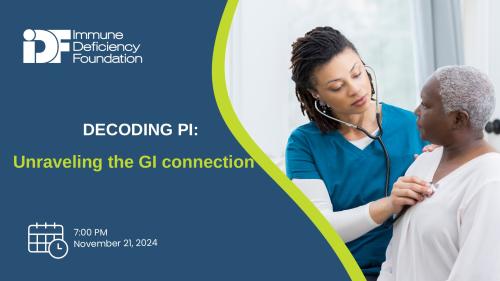
-
Understanding primary immunodeficiency (PI)

Understanding PI
The more you understand about primary immunodeficiency (PI), the better you can live with the disease or support others in your life with PI. Learn more about PI, including the various diagnoses and treatment options.
-
Living with PI
-
Addressing mental health
-
Explaining your diagnosis
- General care
- Get support
- For parents and guardians
-
Managing workplace issues
- Navigating insurance
-
Traveling safely

Living with PI
Living with primary immunodeficiency (PI) can be challenging, but you’re not alone—many people with PI lead full and active lives. With the right support and resources, you can, too.
-
Addressing mental health
-
Get involved

Get involved
Be a hero for those with PI. Change lives by promoting primary immunodeficiency (PI) awareness and taking action in your community through advocacy, donating, volunteering, or fundraising.
-
Advancing research and clinical care
-
Grants
-
IDF surveys
-
Participating in clinical trials
-
Diagnosing PI
-
Consulting immunologist
-
Clinician education

Advancing research and clinical care
Whether you’re a clinician, researcher, or an individual with primary immunodeficiency (PI), IDF has resources to help you advance the field. Get details on surveys, grants, and clinical trials.
-
Grants
Laboratory tests play an essential role in diagnosing and treating primary immunodeficiencies (PI), also known as inborn errors of immunity (IEI). However, a patient’s health history is equally important. A person’s health experiences guide a provider as they order and interpret tests, said Dr. Mark Riedl, professor of medicine in the Division of Allergy and Immunology at the University of California, San Diego.
“This is the most important diagnostic test that we do as medical professionals is to hear your story, to talk to you, to listen to what’s been happening in your life with your health,” said Riedl who spoke on “Demystifying Lab Tests” at the 2024 PI Conference.
A patient with the following health history suggests an immunodeficiency:
- Frequent and/or unusual infections.
- Infections that don’t respond to treatment.
- A family history of infections, immune deficiency, or death at an early age.
- Non-infectious inflammatory conditions such as autoimmune conditions, gastrointestinal problems, and lung symptoms.
- Cancer of the immune system such as lymphoma or leukemia.
“This is very important because it tells us where we need to be looking and it’s also important when we get the results back. These labs are unimportant in a vacuum, just numbers on a page. The only thing they are relevant for is for you and how you are doing with your health,” said Riedl.
“I often tell our residents, we as physicians, we don’t treat lab numbers, we treat people. So yes, we need to check and interpret the labs, but the only reason they matter is because of the person on the other end who's having the problems, having symptoms, having health issues. It’s critical to interpret anything you get back from the lab relative to how you or your family members are doing.”
Knowing a person’s health history helps clinicians navigate both the complexity of the immune system and the hundreds of known types of PI that could be the diagnosis. Clinicians use clues from the shared patient information to decide which branch of the immune system to explore. For example, fungal and viral infections could mean T cell disruption while bacterial infections point to an issue with B cells.
“What types of infections you’ve had tells us where we should be looking and shining that flashlight and doing the testing,” said Riedl.
After a provider collects a thorough health history, laboratory testing evaluates both the quantity and quality of the immune response.
“We want to count cells and antibodies, to make sure that the levels are where they should be, but we are also very concerned about quality—meaning the cells that are there need to be able to do their job, they need to be functional,” said Riedl.
“This is a little bit of an iterative process, which means when you first see someone in immunology, we will probably suggest a panel of tests. Then we are going to look at those and use them to decide where we go next.”
Typically, in the first stage of immunological testing, the provider:
- Obtains a careful health history.
- Performs a physical exam.
- Runs a complete blood count (CBC) with differential (which measures the number of each type of white blood cell).
- Orders a chest X-ray for lung issues if needed.
- Measures immunoglobulin (Ig) levels, including IgG, IgM, and IgA.
“The immunoglobulin levels should be done pretty early. That’s a straightforward test to get and if that’s abnormal we know that we need to dig deeper and figure out ‘why is that?’ and ‘what more do we need to look at?’” said Riedl.
Ig levels can vary in each person, but the normal range is:
- IgG 700-1,500 mg/dL.
- IgA 60-400 mg/dL.
- IgM 60-300 mg/dL.
IgG is the most important of the three, said Riedl, and providers pay attention to that level as a marker for antibody deficiency.
Riedl stressed IgG level requirements to stay healthy can be different in each person so just because a person is in the normal range doesn’t mean they are well.
He also pointed out that a PI diagnosis should be established before the administration of Ig replacement therapy because the treatment interferes with accurate Ig measurements.
“It’s really important to establish the diagnosis as clearly as possible prior to starting Ig treatment because, once you go on it, it’s very hard to go back and measure these things. You have to stop the treatment basically, which you don’t want to do because it’s helping you,” said Riedl.
A patient should also notify their other specialists that they are on Ig replacement therapy because those specialists can no longer rely on their usual antibody tests to diagnose or monitor a patient’s condition.
“Once you are on Ig treatment it will interfere with a lot of other tests that our colleagues like to send. That’s particularly true for infectious disease where they measure antibodies to different bacteria or viruses, and may also be a problem for rheumatology where they may want to measure antibodies to your own tissues.
"Remember, when you get Ig treatment, you are literally getting antibodies from thousands of other people and so when you get your blood drawn on Ig treatments, they are measuring antibodies from the general population not you anymore,” said Riedl.
“So I have to remind my colleagues if you send anti-thyroid antibodies or you send an antibody to the latest virus that’s going around and your patient is getting Ig treatment, it’s probably not accurate because there’s interference from that treatment.”
While testing Ig measures the quantity of antibodies, evaluating an immune response to a vaccine determines the quality of the antibodies.
Providers first test baseline titers, or specific-antibody response to vaccines a patient has had in the past. If those titers are protective, then testing ends. If those baseline levels are not protective, then the provider administers the tetanus/diphtheria and Pneumovax vaccines. After four to six weeks, the antibody response is measured. Post-vaccine titers not at protective levels indicate a poor functional immune response.
Other tests, such as flow cytometry test and the lymphocyte proliferation assay, take deeper dives into the immune system.
Flow cytometry measures the size, complexity, and amount of immune cells such as T cells, B cells, and natural killer (NK) cells.
“Flow cytometry makes sure the right numbers of cells are there, and that you are making the appropriate types of cells to make your immune system work,” said Riedl.
The lymphocyte proliferation assay examines how well T cells react to certain antigens that should stimulate the immune system.
“How well do those lymphocytes activate? Do they ramp up like they should in the presence of a pathogen or antigen or are they lazy and hang out and don’t do what they are supposed to?” explained Riedl.
Another evaluation tool is genetic testing, which examines a person’s genes to try and determine the cause of a PI. The three most common genetic tests for PI are:
- Gene panels: Clinicians review a list of genes known to cause immune system problems to see if a person has variants, or changes in the make-up of any of those genes.
- Whole exome sequencing (WES): Clinicians sequence all of a person’s genes to see if the DNA is coding for a protein that doesn’t work correctly, which could affect immune function.
- Whole genome sequencing (WGS): Clinicians sequence a person’s entire DNA to determine if there is a cause for PI.
Gene panels provide a modest amount of data, WES a fair amount of data, and WGS a lot of data, said Riedl. WES and WGS require heavy interpretation of the data, a process known as bioinformatics.
“Bioinformatics is incredibly complicated, meaning you often need whole teams of people to look at all that data,” said Riedl. “It’s becoming less and less expensive to get this data, but the problem is on the back end—who is going to tell you what it means?
“Universities are often good at this. They have whole teams of people, but your average doctor sitting in the office doesn’t have that expertise nor does he have the time to do this for all his patients. This takes weeks and weeks of looking at a single person’s DNA.”
Gene panels can be just as successful as WES at determining PI type, said Riedl, and interpreting the results is doable in an office-based setting. If a patient chooses a gene panel, they will receive one of three results back:
- Positive: The variant causing PI is identified.
- Negative: There is no variant or variant of undetermined significance (VUS) in the tested genes.
- Indeterminate: Variants of undetermined significance, or VUS, were found.
A VUS result is typical for patients, said Riedl.
“This is where we have to go to the literature, to the patients, to the story, and ask does any of this make sense based on that gene and what we know about that gene and what that gene does? And this does take a little bit of time,” said Riedl.
“This is some of the reticence to order gene panels that we see amongst clinicians, but this is very common. So, if you have genetic testing done, just be prepared that this is a possible outcome. I always try to temper people’s expectations with genetic testing. It’s not a black-or-white answer. It’s often very gray in terms of the data that we get back currently.”
So, why do genetic testing at all?
“We do it because, in roughly a third of people with PI, it makes a difference. It either changes the diagnosis or the treatment plan, or at the very least allows counseling to the family to say this is or isn’t a genetic problem, at least based on the testing we can do,” said Riedl.
Riedl said he understands that testing can be “annoying” and time-consuming but keep in mind that PI is complex.
“My advice to you is to just keep moving forward, get as much information as you can, but understand that the most important thing is how you are doing clinically. The labs are just a tool to try to help us improve that,” he said.
Watch 2024 PI Conference sessions
Missed a session or want a refresher? 2024 PI Conference session recordings are now available!
Browse sessionsTopics
Sign up for updates from IDF
Receive news and helpful resources to your cell phone or inbox. You can change or cancel your subscription at any time.





The Immune Deficiency Foundation improves the diagnosis, treatment, and quality of life for every person affected by primary immunodeficiency.
We foster a community that is connected, engaged, and empowered through advocacy, education, and research.
Combined Charity Campaign | CFC# 66309




